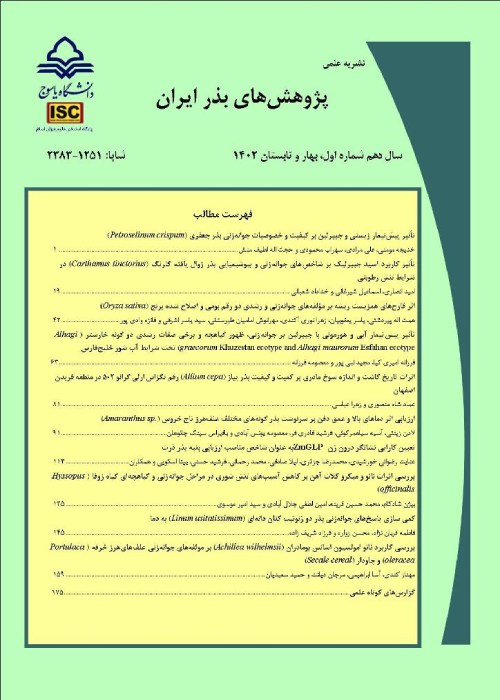Evaluating the possibility of increasing freezing tolerance in chickpeas (Cicer arietinum) by seed priming
One of the major reasons behind the unstable yield of chickpea, is the simultaneity of the reproductive stage with drought and late-season heat. Autumn sowing of chickpea is among the suitable approaches to improve chickpea yield. On the other hand, freezing stress is a limiting factor in the autumn sowing of chickpea. Recently, seed priming has been developed as an essential method to induce plant tolerance to environmental stress. The priming will result in a rapid response of the plant to stress. Freezing, as an environmental stress, limits the growth and development of many plants in different parts of the world. Studies show that in addition to acclimation, short-term biotic and abiotic stresses as pretreatment could also increase the plant's tolerance to cold stress. This process alters the freezing response positively.
This experiment was conducted as a factorial in a completely randomized design with three replicates at the greenhouse of the Research Center for Plant Sciences of Ferdowsi University, Mashhad Iran, in 2018. The experimental factors consisted of various temperatures (0, -12, -15, and -17 °C), seed priming at 10 levels (control (without priming), hydropriming, priming with sodium chloride, salicylic acid, sodium nitroprusside, phosphate solubilizing bacteria and potassium solubilizing bacteria, amino acids, potassium nitrate, and zinc sulfate) and different chickpea genotypes (MCC505, ILC8617, MCC495, and Saral cultivar). In this experiment, the measured parameters included survival percentage, electrolyte leakage percentage, and lethal temperature resulting in 50% mortality according to the electrolyte leakage and survival percentage.
The results showed that the application of hydropriming, priming with sodium nitroprusside and zinc sulfate had favorable effects on the survival rate and electrolyte leakage. Among these, priming with sodium nitroprusside increased the survival percentage compared to the control (23%) at the -15 and -17 °C in the Saral cultivar, at -15 °C in the ILC8617 genotype, and at -12 and -15 °C in the MCC495 genotype treatment to 68, 58, 85 and 55 percent, respectively. In addition, this treatment reduced the electrolyte leakage by 13% at -15 °C in the ILC8617 genotype compared to the control treatment. Further, the mentioned treatment resulted in a 40% reduction in lethal temperature resulting in 50% mortality according to the survival percentage. In the MCC495 genotype compared to the control treatment.
Overall, the cold stress in the chickpea plants resulted in an increase in electrolyte leakage and a decrease in the survival percentage. Application of sodium nitroprusside priming by improving cold stress tolerance resulted in a reduction of lethal temperature resulting in 50% mortality based on electrolyte leakage and survival percentage results. Additionally, the applied priming in improving the cold stress tolerance mainly improved the survival percentage compared to the improvement in the electrolyte leakage.
The effect of different primings on the freezing tolerance of chickpeas was investigated and determined.
The freezing tolerance threshold of chickpea seedlings was determined at the laboratory under different primings.
The respondents of genotypes to priming and the behavior of genotypes towards each other were investigated.
- حق عضویت دریافتی صرف حمایت از نشریات عضو و نگهداری، تکمیل و توسعه مگیران میشود.
- پرداخت حق اشتراک و دانلود مقالات اجازه بازنشر آن در سایر رسانههای چاپی و دیجیتال را به کاربر نمیدهد.



